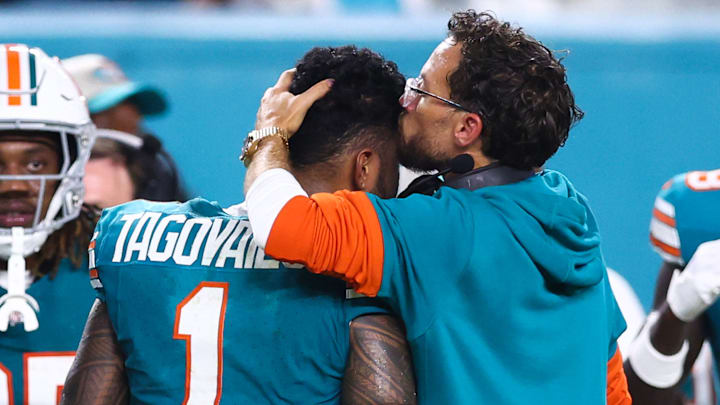Despite growing concerns from the media and former players urging him to retire, Tua Tagovailoa has made it clear: according to NFL. Network's Ian Rappaport, he has no plans to walk away from the game. Instead, he’s focused on proving his worth, determined to live up to the massive contract the Dolphins granted him this past offseason. Tua could have called it quits after suffering his latest concussion, but his decision to continue playing proves it’s not just about the money—it's about resilience, passion, and silencing the critics who have doubted him throughout his career
Tua Tagovailoa’s football journey has been filled with highs, lows, and adversity from the start. From his days at Alabama, where he captivated fans with his stellar performances, to the career-threatening injury he suffered before entering the NFL Draft, his resilience has always been a defining trait. After suffering a dislocated hip in 2019, many doubted he would ever return to form, let alone reach the NFL as a top prospect. Yet, Tua battled back and was drafted fifth overall by the Miami Dolphins.
From day one, his time in Miami was rocky. With Brian Flores as head coach and a struggling offense where Ryan Fitzpatrick—a veteran journeyman—was the team's leading rusher, Tua faced intense scrutiny. Critics labeled him a bust, questioning his arm talent and decision-making. When the Dolphins passed on the opportunity to trade for Deshaun Watson, the media sharpened its claws, citing the team’s inability to build a functional franchise.
However, the narrative shifted when Tyreek Hill joined the Dolphins. Many speculated this would spell disaster for Hill’s career, but Tua proved the doubters wrong. Hill posted career-high numbers with Tua at quarterback, showcasing the young signal-caller’s ability to elevate the team. Still, despite their regular-season success, the media dismissed the accomplishment, pointing out the team’s lackluster playoff performance and Tua's missed games due to injury.
The criticism didn’t stop there. Oddly, the media often focused on Tua’s perceived weaknesses, attributing his success to head coach Mike McDaniel and weapons like Hill and Jaylen Waddle. In contrast, quarterbacks like Joe Burrow and Justin Herbert were praised without similar scrutiny, despite having their own arsenal of elite talent from day one. Burrow had Ja’Marr Chase, Tee Higgins, and Joe Mixon, while Herbert had Mike Williams, Keenan Allen, and Austin Ekeler at his disposal. Jalen Hurts, with the support of an elite offensive line and weapons like A.J. Brown and Devonta Smith, also escaped the intense level of critique that followed Tua.
While it’s true that Burrow and Hurts have helped lead their teams to Super Bowls, Tua has quietly improved every season despite the challenges. Meanwhile, both Burrow and Hurts have experienced some regression—whether due to injury in Burrow’s case or the inability to recapture the previous year’s magic in Hurts’ case. Through it all, Tua’s progression has been steady and impressive.
What the media fails to acknowledge enough is Tua’s football IQ. His quick decision-making and precision have made him a formidable quarterback, despite his physical limitations and injury concerns. Yet, the conversation around his concussions cannot be ignored. After suffering his third documented concussion, many prominent figures in football are calling for him to step away for his long-term health. Raiders coach Antonio Pierce commented,.
"“At some point, you know, he's going to live longer than he's going to play football. Take care of your family”"Antonio Pierce
Similarly, Tony Gonzalez has voiced concerns.
" “I’m thinking retirement here. To me, it seems like a no-brainer”"Tony Gonzalez
Yes, concussions and CTE are serious threats, but many of those calling for him to retire are ignoring their own history with concussions. Players like Troy Aikman and Steve Young had multiple concussions during their careers, yet have gone on to have successful lives post-football. The narrative that Tua should walk away simply because of media speculation does not take into account his love for the game and his desire to prove himself.
In all fairness, there is an argument to be made as it pertains to Tua not wanting to retire. If the former first round pick voluntarily retired, he would potentially forfeit up to $124 million of the $167.2 million guaranteed in his contract, leaving him with only about $43.2 million from the guaranteed portion. He might also have to return part of his $33.6 million signing bonus. However, the Dolphins could decide not to pursue a full return of that bonus, which would impact the final amount he walks away with.
According to CBS Sports, if Tua had retired voluntarily, he could ultimately retain around $43.2 million, plus whatever portion of his signing bonus the Dolphins choose not to recoup. If the Dolphins don’t pursue the signing bonus, he could keep more, but the exact amount depends on how much, if any, of that $33.6 million he has to return. Even with all of that riding on the line, the amount of money he'll have is still generational wealth.
At the end of the day, Tua’s choice to continue playing football is not about money or fame—it’s about silencing the doubters. He wants to live up to expectations, and there’s nothing wrong with that. He’s shown time and again that he belongs, and his decision to keep fighting deserves nothing but respect.
